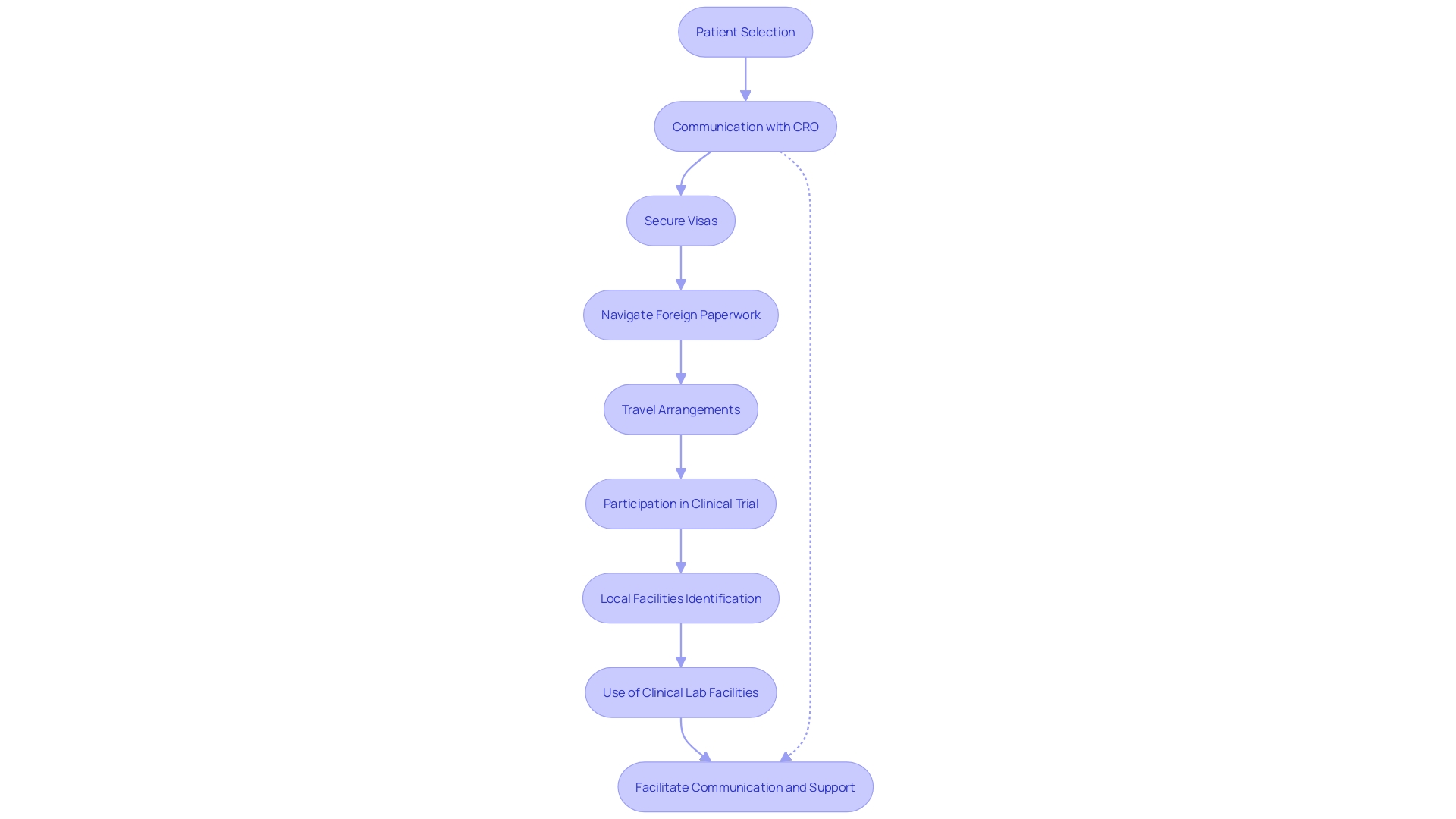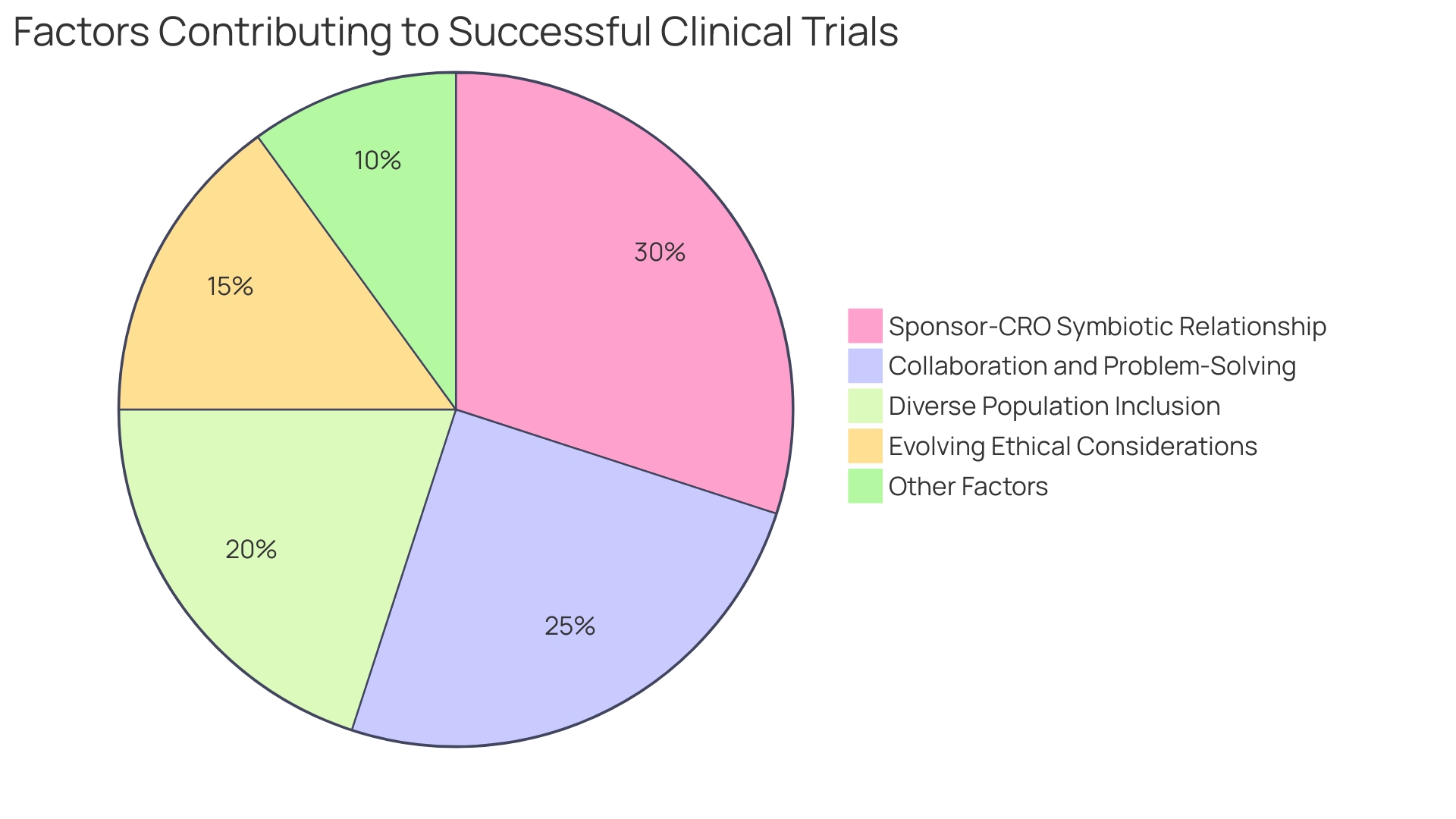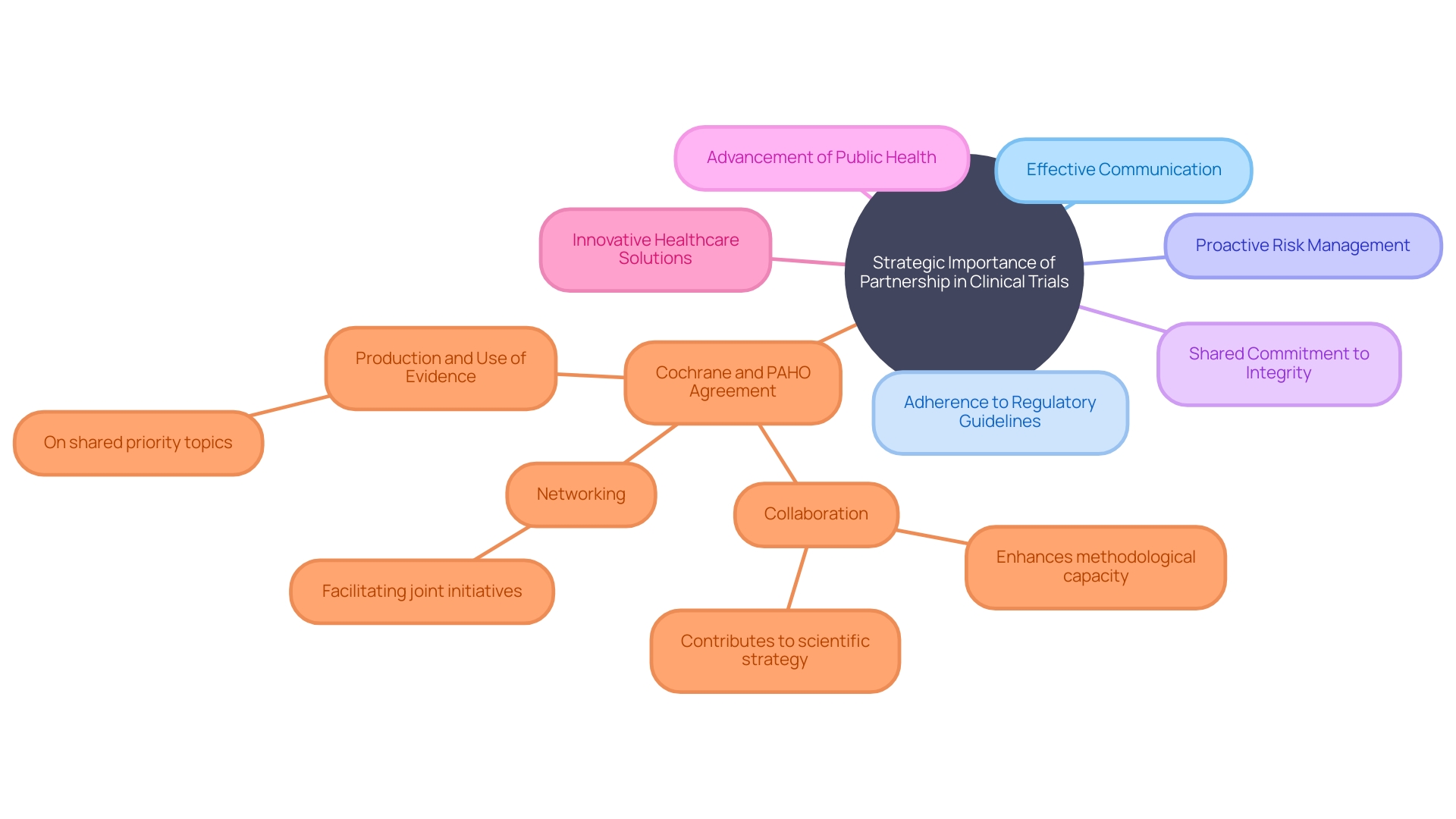Introduction
In the realm of clinical trials, selecting a Contract Research Organization (CRO) is a pivotal decision that requires a strategic approach. This article explores the key considerations and best practices for choosing the right CRO for your study. It emphasizes the importance of specific, measurable, attainable, relevant, and time-bound requirements (SMART criteria) in aligning a CRO's expertise with your trial's needs.
Additionally, it highlights the significance of effective communication, quality control measures, mitigating common challenges, and building a strong partnership with your CRO. The article also discusses the role of CROs in clinical trials and the importance of collaboration and transparency. Overall, it provides valuable insights into optimizing the selection process and maximizing the success of your clinical trial.
Strong Track Record: Evaluating a CRO’s Experience and Successes
In the realm of clinical trials, the selection of a Contract Research Organization (CRO) is a pivotal decision that demands a strategic approach. A CRO like CMIC Group, with over three decades of pioneering experience in Japan, offers a comprehensive suite of services that span the entire pharmaceutical value-chain.
When assessing a CRO, it's essential to apply the SMART criteria to your requirements—ensuring they are Specific, Measurable, Attainable, Relevant, and Time-bound. This precision in defining your needs enables you to receive accurate quotes tailored to your project's exact requirements.
Furthermore, it's vital to discern which aspects of your clinical trial can be managed internally, given that many clinical teams operate with limited resources. By carefully mapping out these in-house capabilities, you can identify which services you truly need from a CRO partner. This approach not only streamlines the selection process but also ensures that the chosen CRO's expertise aligns perfectly with your trial's specific therapeutic area, enhancing the likelihood of its success.
Effective Communication Strategies: Ensuring Transparency and Collaboration
In the realm of clinical trials, where new treatments are meticulously tested for safety and efficacy, the role of a Contract Research Organization (CRO) extends far beyond basic management tasks. Take, for example, a patient from rural Pennsylvania facing an ultra-rare disease with no approved treatment available.
They are presented with the chance to join a clinical trial in Turkey, potentially altering their prognosis. This not only signals hope but also introduces a complex set of logistical challenges, including securing visas, navigating foreign paperwork, and coordinating travel.
A CRO adept in handling such multifaceted situations becomes indispensable. They must facilitate seamless communication, bridging the gap between the clinical trial's requirements and the patient's needs. An optimal CRO should not only be transparent but proactive, ensuring that every query—from travel arrangements to trial specifics—is promptly and clearly addressed. This level of communication fosters informed decision-making and supports patients and their families through the intricate journey of participating in a clinical trial, especially one that spans across borders.

Quality Control Measures: Ensuring Regulatory Compliance and Patient Safety
The rigorous standards set for clinical trials cannot be overstated, given their role in determining the safety and efficacy of new medical treatments and devices. A Contract Research Organization (CRO) must, therefore, embody the pinnacle of quality control, adhering strictly to regulatory guidelines and maintaining a comprehensive system to assure compliance.
Key elements to look for in a CRO include meticulously documented standard operating procedures (SOPs), a team of well-trained professionals, and an effective system for monitoring and reporting. Sections 3.1 to 3.3 of MDCG 2024-3 emphasize the importance of providing detailed information about the device under investigation, including its intended purpose, patient populations, and indications for use.
Moreover, it is crucial to present a balanced benefit-risk ratio and a solid rationale for it. In line with this, the WHO underscores the significance of managing clinical data meticulously, a practice which is instrumental in protecting the safety of trial participants and ensuring the credibility of study outcomes.
The integrity of clinical data is paramount, as inconsistencies in data analysis and presentation can lead to erroneous conclusions, potentially affecting patient care and outcomes. This underscores the necessity for a CRO to not only collect and manage data effectively but also analyze it with the same level of rigor as primary data. Moreover, the ethical considerations in clinical trials are evolving, with an increased focus on fair treatment of participants, including appropriate compensation for their time and the risks they undertake. This shift in perspective aligns with the ethical guidelines suggested by the Declaration of Helsinki, which advocates for the fair treatment of research subjects. As such, selecting a CRO that embodies these principles is essential for the integrity and success of clinical trials.

Mitigating Common Challenges: Managing Risks and Ensuring Success
Selecting the right Contract Research Organization (CRO) is pivotal in ensuring the smooth execution of clinical trials, particularly when dealing with the complexities of international studies. A case in point is a patient from rural Pennsylvania facing an ultra-rare disease with no approved treatments available in the United States, who is offered a chance to join a clinical trial in Turkey.
The logistical hurdles such as visa procurement, language barriers, and travel coordination highlight the need for a CRO that not only has a strong risk management strategy but also a deep understanding of cross-border clinical operations. The chosen CRO should exemplify a proactive stance in identifying and mitigating potential risks, possessing the foresight to implement early solutions that address such challenges.
Their experience should reflect a history of adeptly handling unforeseen circumstances, ensuring that the trial remains on track despite any obstacles. A robust contingency plan is a testament to a CRO's preparedness, illustrating their commitment to the continuity and success of the trial.
Moreover, aligning with a CRO that can facilitate seamless logistical support for international participants is crucial, as it directly impacts patient accessibility and trial viability. In establishing a partnership with a CRO, it is essential to define your requirements using the SMART criteria—specific, measurable, attainable, relevant, and time-bound—to guarantee that the scope of work is precise and achievable. This clarity in expectations ensures that the CRO can provide targeted services without superfluous or insufficient offerings. Understanding the capabilities that can be managed internally versus those that necessitate external expertise is another critical step in optimizing resource allocation for the trial. Ultimately, the right CRO partnership is one that enhances the trial's efficiency, upholds its integrity, and expands its access to those in need of innovative treatments.
The Importance of Collaboration: Building a Strong Partnership with Your CRO
The essence of successful clinical trials lies in the symbiotic relationship that is forged between the sponsor and the Clinical Research Organization (CRO). It's crucial to identify a CRO that not only understands the value of collaboration but also actively seeks to engage the sponsor in key decisions and collaborative problem-solving. Such a partnership is not a mere convenience; it is a cornerstone of trust, facilitating open and effective communication, and it significantly increases the likelihood of conducting a successful clinical trial.
This collaborative approach is exemplified by healthcare entities like Walgreens, which leverages its trusted presence in communities to advance clinical research accessibility. By transforming their locations into hubs for clinical trial services, they address the critical care gaps and barriers to equitable access, thereby enhancing the integrity of clinical research. Furthermore, the significance of including diverse populations in clinical trials cannot be overstated, as it directly impacts health equality.
Data reveals that health outcomes for underserved populations are disproportionately worse, with some communities experiencing a decline in life expectancy. Inclusion in clinical trials is not just a moral imperative but also a scientific and care obligation, as access to such trials often equates to receiving the standard of care. Lastly, the ethical dimension of clinical trials is evolving.
Compensation for trial participants is increasingly recognized as fair treatment, acknowledging the contributions they make to public health. Just as first responders are compensated for their service, clinical trial participants should receive appropriate reimbursement for their expenses, time, and the potential risks they shoulder. This ethical consideration is as much a part of the collaboration as the shared pursuit of medical advancements.

Understanding the Role of CROs in Clinical Trials: Leveraging Expertise and Resources
Choosing the most suitable Contract Research Organization (CRO) is a strategic decision that requires a clear understanding of your clinical trial's unique needs. A CRO's contribution extends beyond mere support; it offers a wealth of expertise, resources such as specialized staff and facilities, and access to specific patient demographics.
To ensure the success of your clinical trial, it's imperative to meticulously define your requirements using the SMART criteria—making them Specific, Measurable, Attainable, Relevant, and Time-bound. This precision in planning will enable you to effectively communicate your needs, ensuring that quotes from potential partners are tailored to your trial's exact requirements.
Additionally, it's crucial to assess your in-house capabilities to determine which aspects of the trial can be managed internally. This introspection is particularly important given the lean nature of many clinical teams. By carefully aligning a CRO's capabilities with the specific demands of your trial and recognizing the broader context of clinical practice, you can leverage their expertise to its fullest potential. This approach not only enhances the efficiency of trial performance but also addresses the critical issue of translating trial results into clinical practice, as underscored by recent discussions at the JAMA Summit.
Selecting the Right CRO for Your Study: Key Considerations and Best Practices
When selecting a Contract Research Organization (CRO) for clinical trials in Latin America, it is paramount to adopt a strategic approach rooted in the SMART criteria: Specific, Measurable, Attainable, Relevant, and Time-bound requirements. This framework ensures that the CRO's proposal aligns precisely with your study's needs. It is critical to compare the expertise and track record of various CROss, particularly their experience with the unique regulatory challenges and digital therapeutic advancements in the region.
With the increasing complexity of clinical trials, such as those involving cross-border logistics for patients with rare diseases, a CRO must demonstrate robust communication strategies and a deep understanding of the local and international regulatory landscapes. Furthermore, consulting with regulatory authorities and seeking recommendations from reliable industry sources can provide additional insights into the CRO's capabilities to manage and execute clinical trials effectively. A meticulous evaluation process helps in identifying a CRO that not only comprehends the intricate regulatory requirements but also shares your commitment to advancing medical knowledge and improving patient outcomes in Latin America.
Case Study: Successful CRO Collaboration in a Clinical Trial
The collaboration between a sponsor and a clinical research organization (CRO) in Latin America highlights the strategic importance of partnership in clinical trials. Effective communication was pivotal, ensuring that both parties were aligned on objectives and could swiftly navigate the complex regulatory environment.
Adherence to regulatory guidelines was not just about compliance but also about ethical considerations, recognizing the value of participants' contributions to the advancement of public health. Proactive risk management, involving careful planning and responsiveness to potential challenges, played a crucial role in the success of the clinical trial.
The case exemplifies how a well-chosen CRO can be instrumental in achieving trial goals, underscored by a shared commitment to integrity and the pursuit of innovative healthcare solutions. This approach resonates with the ethos of organizations like Boehringer Ingelheim, which emphasizes the interconnectedness of human and animal health and the collective effort to improve it. Moreover, the recent agreement between Cochrane and PAHO exemplifies the kind of collaboration that can enhance methodological capacity and contribute to a robust scientific strategy in the region. Such partnerships underscore the importance of fair treatment of clinical trial participants, recognizing the ethical imperative to compensate them for their time and contribution to societal well-being, akin to how we value the service of first responders.

Conclusion
In conclusion, selecting the right Contract Research Organization (CRO) for your clinical trial is a strategic decision that requires careful consideration. Applying the SMART criteria to your requirements ensures alignment with the CRO's expertise.
Effective communication, quality control measures, and risk mitigation strategies are crucial for success. Building a strong partnership with your CRO fosters collaboration and transparency, enhancing the likelihood of success.
Inclusion of diverse populations in clinical trials and fair compensation for participants contribute to health equality and ethical considerations. Understanding the role of CROs helps leverage their expertise and resources effectively.
Defining requirements using the SMART criteria enables targeted services. Assessing in-house capabilities optimizes resource allocation. By considering these factors, you can maximize the success of your clinical trial. Choose a CRO with experience, effective communication, quality control measures, and a clear understanding of their role in clinical trials. Selecting the right CRO is pivotal for successful clinical trials.




